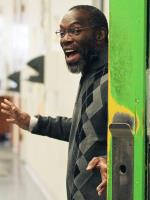 In 1997, Stephen Jay Gould published an essay, “Non-Overlapping Magisteria.” In it, he posited the idea that there was no conflict between religion and science because they dealt with different things. For example, religion was concerned with questions of morals and existence — issues on which science had no opinion. One could question this on the moral front, where science actually has a lot to say about many of our morals. But the obvious counterargument is that religion isn’t really concerned with morality as we find it but rather morality as we ought to find it. On the issue of existence, science really does have nothing of value to add, although sadly most atheists can’t seem to understand that.
In 1997, Stephen Jay Gould published an essay, “Non-Overlapping Magisteria.” In it, he posited the idea that there was no conflict between religion and science because they dealt with different things. For example, religion was concerned with questions of morals and existence — issues on which science had no opinion. One could question this on the moral front, where science actually has a lot to say about many of our morals. But the obvious counterargument is that religion isn’t really concerned with morality as we find it but rather morality as we ought to find it. On the issue of existence, science really does have nothing of value to add, although sadly most atheists can’t seem to understand that.
I’ve always seen Gould’s essay as more a plea to religions to stay on their own ground. One of my great frustrations in dealing with theists is their reliance on Iron Age myths for their science. So they think that Genesis is literally true. But claims like humans being created originally in their current form and the Grand Canyon being formed by the great flood are not religious claims; they are scientific claims. Not only do these fanciful stories soil science, they also make religious people stupid in a theological sense.
Recently, the atheist community has begun to attack the idea behind Non-Overlapping Magisteria. In fact, they are so outspoken about it, I had assumed that I had missed something — that there was some critical flaw with the idea. But then I came upon the following video by Hemant Mehta. In general, I like his work. But on this video, he shows his smug atheist colors. I take special offense to one line, “If you are a devoutly religious person, and one who accepts the scientific method, something’s gotta give.” Ugh!
I am greatly concerned about the way the atheist community fetishizes the scientific method. They seem to have learned about this in high school science class and decided it was The Truth™. I noticed this same thing in the first episode of the new Cosmos. Neil deGrasse Tyson said that even though Giordano Bruno was right about stars just being other solar systems, he wasn’t a scientist. Why? Apparently because he never proved that it was true. He just had an intuition. This is an enormous error of thought. It mistakes the scientific process for what any given scientist does. What Bruno did was no different from what Einstein or Maxwell or Newton did.
 What Mehta is getting at is that people who accept the “scientific method” only believe things that have been proved. This is patently false. What it means in practice is that atheists believe in the current state of science. Hooray for that! But most issues are not this clear. When it comes to the murky waters of economics or child rearing, do atheists really use the “scientific method” or do they just go with their gut? We all know the answer to that regardless of what some iconoclastic atheist might say.
What Mehta is getting at is that people who accept the “scientific method” only believe things that have been proved. This is patently false. What it means in practice is that atheists believe in the current state of science. Hooray for that! But most issues are not this clear. When it comes to the murky waters of economics or child rearing, do atheists really use the “scientific method” or do they just go with their gut? We all know the answer to that regardless of what some iconoclastic atheist might say.
There is one issue on which science has no opinion: ontology. And here I’m not just talking about the fact that science has no answers. Science is not designed to answer questions that exist outside the realm of existence itself. But I’ll admit: maybe some day science will have answers. But given the fundamental paradox of existence, it seems unlikely. But until then, science has no answer. And to expect people to simply have no opinion on such a fundamental question until science does have an answer is just silly.
I think that the Non-Overlapping Magisteria concept is just what we need today. I’ve already mentioned how religions soil science by applying their Iron Age myths to scientific questions. But atheists have a strong tendency to soil religion by applying scientific answers to theological questions. The ultimate example of this is Lawrence Krauss’ facile ontological answer, “Nothing is unstable.” It’s a perfectly fine scientific answer to why universes form. Similarly, the big bang is a perfectly fine scientific answer. And if we ever manage to show that our universe is part of a multiverse, that too will be perfectly fine scientific answer. But people who are interested in the ultimate question of why anything exists at all will not be satisfied with these answers.
From my perspective, there is one and only one question that is beyond the conceivable reach of science. But it is the biggest question there is. And atheists do themselves no good by pretending (1) that the question doesn’t matter and (2) that eventually science will answer it. And the idea that science has answered it is just fatuous. Atheists need the idea of Non-Overlapping Magisteria. Stephen Jay Gould was a lot smarter than the leaders of the New Atheist movement.
See also: Non-Overlapping Magisteria Helps Theists and Atheists
 The most repetitive story in America never gets boring. You know the one. The police pick up some guy and decide he committed a murder. The guy is always poor and almost always dark skinned. So the police get someone to lie or do so themselves. And then decades later, he is exonerated. It’s so much nicer than the much more common story that is the same except for the end, “And the state put him to death despite many problems with the case.” Now we have the story of Ricky Jackson and Wiley Bridgeman — two men released from the Ohio prison system on Friday after 39 years behind bars. Because Jackson was in a bit longer, he now holds the record for the longest time spent in jail before being exonerated. I assume Bridgeman holds the record for the second longest.
The most repetitive story in America never gets boring. You know the one. The police pick up some guy and decide he committed a murder. The guy is always poor and almost always dark skinned. So the police get someone to lie or do so themselves. And then decades later, he is exonerated. It’s so much nicer than the much more common story that is the same except for the end, “And the state put him to death despite many problems with the case.” Now we have the story of Ricky Jackson and Wiley Bridgeman — two men released from the Ohio prison system on Friday after 39 years behind bars. Because Jackson was in a bit longer, he now holds the record for the longest time spent in jail before being exonerated. I assume Bridgeman holds the record for the second longest.
 I heard from my father that the Fox News ranters have been talking about our double plus good border fence. You know the one: the double fence mandated by the
I heard from my father that the Fox News ranters have been talking about our double plus good border fence. You know the one: the double fence mandated by the  In 1997, Stephen Jay Gould published an essay, “Non-Overlapping Magisteria.” In it, he posited the idea that there was no conflict between religion and science because they dealt with different things. For example, religion was concerned with questions of morals and existence — issues on which science had no opinion. One could question this on the moral front, where science actually has a lot to say about many of our morals. But the obvious counterargument is that religion isn’t really concerned with morality as we find it but rather morality as we ought to find it. On the issue of existence, science really does have nothing of value to add, although sadly most atheists can’t seem to understand that.
In 1997, Stephen Jay Gould published an essay, “Non-Overlapping Magisteria.” In it, he posited the idea that there was no conflict between religion and science because they dealt with different things. For example, religion was concerned with questions of morals and existence — issues on which science had no opinion. One could question this on the moral front, where science actually has a lot to say about many of our morals. But the obvious counterargument is that religion isn’t really concerned with morality as we find it but rather morality as we ought to find it. On the issue of existence, science really does have nothing of value to add, although sadly most atheists can’t seem to understand that. What Mehta is getting at is that people who accept the “scientific method” only believe things that have been proved. This is patently false. What it means in practice is that atheists believe in the current state of science. Hooray for that! But most issues are not this clear. When it comes to the murky waters of economics or child rearing, do atheists really use the “scientific method” or do they just go with their gut? We all know the answer to that regardless of what some iconoclastic atheist might say.
What Mehta is getting at is that people who accept the “scientific method” only believe things that have been proved. This is patently false. What it means in practice is that atheists believe in the current state of science. Hooray for that! But most issues are not this clear. When it comes to the murky waters of economics or child rearing, do atheists really use the “scientific method” or do they just go with their gut? We all know the answer to that regardless of what some iconoclastic atheist might say. Carter’s vice president, Walter Mondale, ran for the presidency in 1984 on a platform that The New York Times called “bluntly conservative,” a “turn to [the] right,” because it promised spending cuts and higher taxes in order to deal with the federal deficit. Yet, after Mondale lost — in a landslide even worse than Carter’s — the verdict among pundits and Democratic strategists was well-nigh unanimous: The party had to cut its ties to what were then called “special interests” (meaning labor and African-Americans) and find its way to the center.
Carter’s vice president, Walter Mondale, ran for the presidency in 1984 on a platform that The New York Times called “bluntly conservative,” a “turn to [the] right,” because it promised spending cuts and higher taxes in order to deal with the federal deficit. Yet, after Mondale lost — in a landslide even worse than Carter’s — the verdict among pundits and Democratic strategists was well-nigh unanimous: The party had to cut its ties to what were then called “special interests” (meaning labor and African-Americans) and find its way to the center. The great screenwriter
The great screenwriter